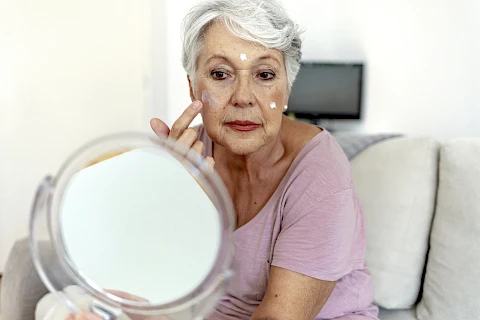
Maintaining healthy skin is important at any age, but it becomes even more necessary for seniors. Seniors often experience concerns like dryness, age spots, and increased sensitivity. We want to explore some effective skin care habits to help seniors care for their skin.
Aging Skin
As we grow older, our skin changes in several ways. It becomes thinner, loses fat, and tends to be less smooth. These changes can lead to dryness, wrinkles, and age spots. Blood vessels in the skin also become more fragile, which can result in bruising and bleeding under the skin. Collagen and elastin fibers, which keep our skin firm and elastic, decrease in strength, making the skin more prone to sagging.
1. Protecting Skin From the Sun
Sun protection is a critical part of healthy skin care for seniors. The sun's rays can cause damage that leads to skin cancer and premature aging. To protect your skin, use sunscreen with at least SPF 30. Apply it generously and reapply every two hours, especially if you're outdoors. Wearing protective clothing, such as wide-brimmed hats and long sleeves, also helps shield the skin from harmful UV rays. Finding shade during the sun's peak hours, usually between 10 a.m. and 4 p.m., can further protect your skin.
2. Staying Hydrated
Hydration plays a key role in maintaining healthy skin. As we age, our skin tends to be drier, making hydration even more important. Drinking plenty of water throughout the day can keep skin supple and hydrated. Aim for at least eight glasses of water a day. A hydrating diet can also benefit your skin. Foods rich in water, such as fruits and vegetables, help maintain moisture levels. Incorporating these into your daily meals can have a positive impact on your skin's health.
3. Using Gentle Products
Choosing gentle skin care products is essential for seniors. Our skin becomes more sensitive as we age, so you need to avoid harsh chemicals and fragrances that can cause irritation. Opt for products labeled "fragrance-free" and "for sensitive skin." Moisturizers with ingredients like hyaluronic acid and glycerin help retain moisture, reducing dryness. Cleansers should be mild, avoiding any that strip the skin of its natural oils. Always patch-test new products on a small area of skin to ensure they won't cause a reaction.
4. Managing Common Skin Concerns
Dryness is a prevalent concern for seniors. To combat this, use a rich, oil-based moisturizer to lock in moisture. Apply it right after bathing when the skin is still damp. For age spots, there are over-the-counter creams that can lighten them over time. Look for products containing ingredients like hydroquinone or glycolic acid.
5. Consulting with a Dermatologist
Seniors need to seek professional advice for their skin care needs. Dermatologists can provide personalized plans to address specific concerns. They can recommend treatments or products suitable for your skin type and condition. Regular check-ups with a dermatologist can ensure any skin issues are caught and treated early. Don't hesitate to consult a professional for guidance in maintaining healthy skin.
Seniors Should Have Healthy Skincare Routines
Taking care of your skin is a lifelong commitment for seniors. By protecting skin from the sun, staying hydrated, using gentle products, and managing common concerns, seniors can maintain healthier skin. Regular consultations with a dermatologist can provide further personalized care. Adopting these healthy skin care habits can make a significant difference.
For personalized senior care services in Raleigh, Cary, and Apex, contact Senior Helpers Triangle today. Let's prioritize your skin's health together.